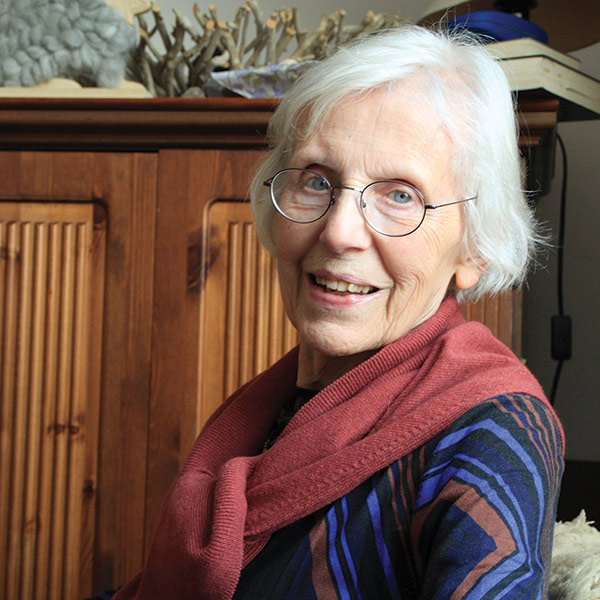Subtotal: $
Checkout-

Turning a Corner
-

Behind the Black Umbrellas
-

With Love We Shall Force Our Brothers
-

The Risk of Gentleness
-

The Great Escape
-

Militant Peacemaking
-

Peacemaking Is Political
-

Beyond Pacifism
-

A Life That Answers War
-

Excerpt: Freiheit!
-

Did You Kill Anyone?
-

Poem: “Candid”
-

Poem: “March Thaw”
-

The Minimalist
-

Call to Prayer, Call to Bread
-

Editors’ Picks: Charis in the World of Wonders
-

Editors’ Picks: The Reindeer Chronicles
-

Editors’ Picks: I Ain’t Marching Anymore
-

Editors’ Picks: “Floaters”
-

Poetry You Can Touch
-

Poem: “Annuals”
-

Poem: “The Widow Offers Herself to Life”
-

Poem: “Mary Magdalen Responds to the Harsh Judge”
-

Poem: “In Retrospect”
-

Poem: “A Backward Look”
-

Poem: “Where Nectar Was”
-

Felix Manz
-

Covering the Cover: The Violence of Love
-

The Case for Meekness
-

Letters from Readers
-

Learning Generosity in Syria

A Tireless Peacemaker
Lore Weber (1936–2020)
By Clemens Weber and Chris Zimmerman
April 16, 2021
Available languages: Deutsch
“A slight, tender-hearted woman with boundless energy, always ready to help, to make peace, to comfort someone, or to stay up late writing yet another letter…” This is the Lore Weber described in an obituary after her death in Germany, in October 2020. She was eighty-four.
During her childhood, in a world awash in swastikas, guns, and fear, Lore developed a keen sense of justice and a deep hunger for peace.
In 1974, with her husband, Gerhard, a Lutheran pastor, she founded the Basisgemeinde, a “base community” modeled after the earliest Christian congregations. Its hallmarks included common housing, worship, work, and property, and a desire to publicly witness to justice and peace. In Gerhard’s words, “To us, giving such a witness meant, first and foremost, trying to actually live out shalom – the peace of God.” Both Gerhard and Lore stayed true to this calling, and to their fellow community members, through thick and thin. (And through years of poverty, marked most visibly by a diet centered around potatoes and whatever else could be grown in the community’s garden.)
In 1990, the Webers founded a branch community in a rundown district of East Berlin. Arson threatened the new beginning (squatters had settled in the building and were not happy to see it being renovated and transformed), as did Gerhard’s untimely death of cancer. Later, rising real estate values – the area became a hipster destination – emerged as the greatest threat to building up. Still, the little household dug in its heels, serving the homeless and the needy who came to their door, and welcoming children into the neighborhood kindergarten the community still runs.
To the end, Lore was tireless in her pursuit of peace and justice, both within her community and on a broader scale: in fighting for tenants’ rights amid a rising tide of gentrification; as a board member of Church and Peace, a European ecumenical network; and more generally as a neighbor, in the biblical sense, to every person whose path crossed her own.
Asked what it means to work for justice and peace, Lore responded, “For years, I asked myself what I had to give or say to people in need – and I knew many! This self-questioning went on and on until, through an alcoholic, I found an answer that allowed me to stop torturing myself. She helped me see that I could simply be there, where such people were and are, and that by virtue of the simple fact that I believed in the unending love of God, I could have an effect on them, even without words.”

Lore Weber on her eighty-fourth birthday in October 2020 Photograph courtesy of the author
Chris Zimmerman is a member of the Bruderhof and teaches at the Mount Academy in Esopus, New York.
Clemens Weber, Lore Weber’s son, is a member of the Basisgemeinde and lives in Berlin.
Already a subscriber? Sign in
Try 3 months of unlimited access. Start your FREE TRIAL today. Cancel anytime.








































